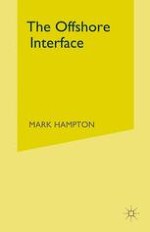1996 | OriginalPaper | Buchkapitel
Area Study: Caribbean Island OFCs and Onshore States
verfasst von : Mark Hampton
Erschienen in: The Offshore Interface
Verlag: Palgrave Macmillan UK
Enthalten in: Professional Book Archive
Aktivieren Sie unsere intelligente Suche, um passende Fachinhalte oder Patente zu finden.
Wählen Sie Textabschnitte aus um mit Künstlicher Intelligenz passenden Patente zu finden. powered by
Markieren Sie Textabschnitte, um KI-gestützt weitere passende Inhalte zu finden. powered by
The political economy of the onshore state and the fractions of capital help explain why different onshore states appear to react so differently to OFCs. We now examine the Caribbean — a region containing several major OFCs — to illustrate the theory. In this chapter we focus on how the onshore political economy and the position of financial capital has affected specific Caribbean island OFCs and their relationships with mainland countries. First we examine the effects of three main European empires (British, Dutch and French) in the Caribbean before contrasting the different approaches of the US and UK governments to island OFCs as exemplified by their attitudes towards tax evasion and drug trafficking/money laundering. This highlights the different approaches and relative power of different government departments and institutions in the two mainland states. In a sense what we have discussed so far can be visualised as being on a vertical scale of abstraction with the most abstract material at the top (the fractions of capital). Now we turn to the other end of the scale, the concrete, and examine the different Caribbean island experiences of colonialism, and especially the changing dynamics of island-mainland relations over time.
